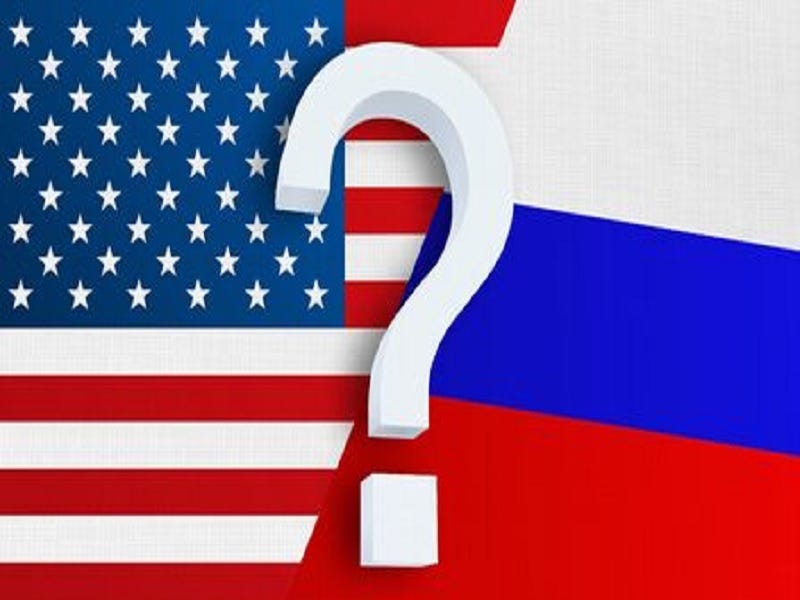It's premature to speculate about the details of their discussions, but the news items shared in this analysis indicate that they could concern the resumption of peace talks and possible pathways for getting there, including those that go around Zelensky or even get rid of him if he remains an obstacle.
Russian-US relations reached their lowest point since the Cuban Missile Crisis as a result of NATO’s proxy war on Russia through Ukraine, but the latest reports suggest that secret talks are taking place between them. NBC reported on 4 November that the West was pressuring Ukraine to recommence peace talks with Russia, which came almost exactly four months after they reported on 6 July that “Former U.S. officials have held secret Ukraine talks with prominent Russians”.
That last-mentioned news item from earlier in the summer followed President Putin’s three appearances the month prior in mid-June wherein he strongly suggested that a political solution to this conflict was still possible, the details of which were documented and analyzed here at the time. Between then and NBC’s latest report, Zelensky gave an interview to The Economist where he was overly defensive. It was analyzed here, with the takeaway being that this was due to the West likely talking more with Russia.
On the same day as their report was published, the New York Times drew attention to the growing Zelensky-Zaluzhny rivalry, the details of which were analyzed here alongside associated news reports. This is relevant to the argument being made about the existence of secret US-Russian talks since they could serve to freeze the conflict in the best-case scenario before the worst-case one of a Prigozhin-like mutiny unfolds. The subsequent reports that’ll now be touched upon add further credence to this case.
Zelensky admitted in an interview with NBC that his Western patrons are probably talking to Russia, during which time he also said that now isn’t the time for elections and then begged the US for a loan that he promised to repay after the conflict ends. On the same day that his interview aired, the Washington Post published a piece about how “Ukraine’s supporters need to rethink their theory of victory” that included the following advice:
“Ukraine’s counteroffensive was supposed to sustain political support for Kyiv by proving that it could reconquer lost territory. Now, supporters of Ukraine might need to make the inverse argument: Ukraine is not reconquering substantial territory, and aid is needed indefinitely to forestall a devastating defeat.”
This is a far cry from the claims of supposedly imminent victory over Russia that used to cover that newspapers pages, thus showing how dramatically the official narrative about this conflict has shifted since the failure of Kiev’s over-hyped and ultra-expensive counteroffensive. The next day, the Ukrainian Foreign Minister warned that his country can no longer solely rely on the US, likely in response to Zelensky’s interview and particularly his admission therein that the US is probably talking to Russia.
A spree of statements from Russian officials then followed between Sunday and Tuesday. Kremlin spokesman Peskov, Foreign Minister Lavrov, and Russian Ambassador to America Antonov all said that dialogue with the US is possible under certain conditions, namely that it respects Russia’s interests. The US then confirmed that it invited Russia to participate in this month’s APEC Summit in San Francisco, which surprised many who thought it would snub that fellow member for obvious political reasons.
The reader should also be aware of what President Putin said last week during his meeting with members of the Civic Chamber where he revealed that “[Americans] are now planning a change of elites – both economic and political one.” He also noted that the West has changed its tune about defeating Russia on the battlefield but advised that “This does not mean that we should behave aggressively”, implying that he still strongly believes that the present conflict can be resolved through political means.
The growing Zelensky-Zaluzhny rivalry and the former’s refusal to hold elections extends credence to the Russian leader’s assessment that the US is preparing a change of Ukraine’s political elites after becoming tired of Zelensky, who’s recklessly risking a Prigozhin-like mutiny and refuses to countenance peace talks. Russian National Security Council chief Patrushev then hinted shortly after on the same day as Zelensky’s NBC interview that “rational actors” are waiting to take power in Kiev once the opportunity arises.
It’s unknown whether he was referring to Zaluzhny, Zelensky’s former senior advisor Arestovich who savagely criticized his erstwhile boss for the damning details revealed about him in Time Magazine’s recent cover story prior to announcing his own presidential bid, and/or someone else. Nevertheless, the point is that Patrushev felt comfortable enough due to the aforementioned context to publicly speak about regime change in Ukraine, which came amidst credible reports of secret US-Russian talks.
It's premature to speculate about the details of their discussions, but the news items shared in this analysis indicate that they could concern the resumption of peace talks and possible pathways for getting there, including those that go around Zelensky or even get rid of him if he remains an obstacle. To be clear, no prediction is being put forth about his political future or the timeline for recommencing Russian-Ukrainian peace talks, but he’d do well to watch his back if he refuses to do his patrons’ bidding.




